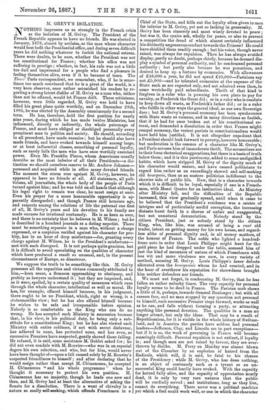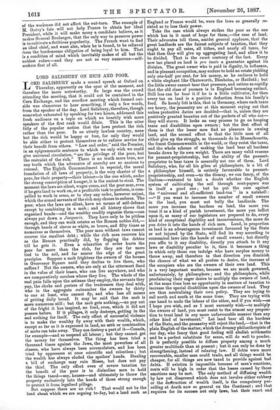M. GREW'S ISOLATION.
NOTHING impresses us so strongly in the French crisis as the isolation of M. Gravy. The President of the French Republic appears to have no friends. He was elected in January, 1879, almost by acclaim, as the man whose character would best befit.the Presidential office, and during seven difficult years he did nothing whatever to forfeit the national esteem. There were doubts, to be sure, whether the President was not too constitutional for France ; whether his office was not suffering in prestige ; whether, in fact, his role was not a little too doll and impersonal for a people who find a pleasure in feeling themselves alive, even if it be because of tears. The Times' Paris correspondent, we remember, who, if he is some- times too much convinced that he is a pivot of the world, is a very keen observer, once rather astonished his readers by re- porting a strong latent dislike of M. Gravy as a man who, rather than not be effaced, would let France drift. These criticisms, however, were little regarded, M. Gravy was held to have filled his great place quite worthily, and on December 28th, 1885, he was elected by the Assembly unanimously for a second term. He has, therefore, held the first position for nearly nine years, during which he has made twelve Ministries, has influenced, directly or indirectly, the whole patronage of France, and must have obliged or disobliged personally every prominent man in politics and society. He should, according to all precedent, have made enemies ; but he should also have made friends, and have evoked towards himself among large, or at least influential classes, something of personal loyalty, such as rarely fails the men who have once worthily exercised power. Even Mr. Franklin Pierce, whom Americans usually describe as the most inferior of all their Presidents—a dis- tinction we should ourselves reserve to Mr. Andrew Johnson— possessed and acquired while in office many devoted friends. The moment the storm rose against M. Chevy, however, he appeared to have no friends at all. All statesmen, all poli- ticians, all journalists, the whole body of the people of Paris turned against him; and he was told on all hands that although his legal right to remain was clear, he must resign at once. Even his prayer for a more honourable opportunity is ap- parently disregarded ; and though France still honours age, and respects among the relations of life the paternal one first of all, M. Grevy's years and his devotion to his family are made excuses for irrational contumely. He is as keen as ever, and there is no certainty that he believes in M. Wilson ; but he is described in a hundred journals as a doting nepotist. There must be something separate in a man who, without a charge expressed, or a suspicion verified against his character for pro- bity, has in an hour of deep misfortune—for, granting every charge against M. Wilson, he is the President's misfortune— met with such disregard. It is not perhaps quite gracious, but it is difficult to avoid speculating on the qualities of character which have produced a result so unusual, and, in the present circumstances of Europe, so disastrous.
We suppose the truth to be something like this. M. Gravy possesses all the capacities and virtues commonly attributed to him,—keen sense, a firmness approaching to obstinacy, and probity as lawyers understand it ; but they are impaired, and, as it were, spoiled, by a certain quality of meanness which runs through the whole character, intellectual as well as moral. He has, for example, effaced himself because, in his judgment, there ought to be no President, which, right or wrong, is a statesmanlike view ; but he has also effaced himself because he wishes to be safe and irresponsible before opinion. Nobody is so comfortable as the King who can do no wrong. He has accepted each Ministry in succession because that, in his view, is his political duty, he being only a sub- stitute for a constitutional King; but he has also viewed each Ministry with entire coldness, if not with secret disfavour, has adhered to none, has protected none, and has even, as successive Premiers have suspected, gently shoved those falling. He refused, it is said, some assistance M. Goblet asked for ; he did not even condole with M. Bouvier—who was in an especial degree his own selection, and who, but for him, would sever have been thought of—upon a fall caused solely by M. Rouvier's suspected friendliness to himself ; and after declaring that he would resign rather than accept M. Clemenceau, he accepted M. Clemenceau "and his whole programme" when he thought it necessary to protect his own position. M. Clemenceau has no majority, though he leads one now and then, and K Gravy had at least the alternative of asking the Senate for a dissolution. There is a want of chivalry in a nature so coolly self-seeking, which offends Frenchmen in a Chief of the State, and kills out the loyalty often given to men far inferior to M. Gravy, yet not so lacking in generosity. M. Gravy has been sincerely and most wisely devoted to peace ; but was it, the cynics ask, wholly for peace, or also to prevent a competition the dread of which almost certainly influenced his distinctly ungenerous conduct towards the Princes? He could have shielded them readily enough ; but his voice, though never raised, was always for expulsion. Then he has always avoided
display, partly no doubt, perhaps chiefly, because he deemed dis- play a symbol of personal authority, and he condemned personal authority ; but partly also because he was penurious, and desired to heap up a fortune by economies. With allowances of £48,000 a year, he did not spend £10,000—Parisians say not .25,000—and he tolerated economies at the expense of the State such as are expected only, and not admired even then, in some wretchedly paid subordinate. Thrift of that kind 'is forgiven in a ruler who is pawning his own plate to pay for cavalry, as Frederick the Great did ; or in a ruler who is resolute to keep down all waste, as Frederick's father did ; or in a ruler who fulfils in other ways the general ideal, as our own Sovereign does ; but M. Gravy's personal economy has been synchronous with State waste so ruinous, and in many directions so foolish, that if he had for once broken out of his constitutional re- treat, and demanded a dissolution in order that France might compel economy, the veriest purists in constitutionalism would have held him justified. It ie not altogether expedient that a President should look forward to poverty, however honourable; but moderation is the essence of a character like M. °vines, and Paris accuses him of immoderate thrift. The accusations are in their form rhetorical exaggerations, but there is a basis of truth below them; and it is this parsimony, added to some undignified habits, which have stripped M. Gravy of the dignity much of his character would ensure, and have caused politicians to regard him rather as an exceedingly shrewd and self.seeking old bourgeois, than as an austere politician indifferent to the
showier side of public life. Now, that is a character towards which it is difficult to be loyal, especially if one is a French- man, with Henri Quatro for an instinctive ideal. As Ministry after Ministry fell, and the difficulties of the Republic increased, this view gradually spread, until when it came to be believed that the President's residence was a centre of intrigue and of particularly sordid corruption, the increasing distaste bunt forth in a chorus of unfair and exaggerated, but not unnatural denunciation. Nobody stood by the citizen President, just as nobody stood by the citizen King, who, like him, was accused of being a ruse old trader, intent on getting money for his own house, and regard- less alike of personal dignity and, in all money matters, of the honour of France. The noble who lighted a hundred- franc note in order that Louis Philippe might hunt for the gold piece he had dropped under the table, accused him sif just the kind of meanness of nature of which Frenchmen with lees wit and more virulence are now, in every variety of method, accusing M. Gravy. Louis Philippe's inner defeat alienated even the bourgeoisie whom he had courted, and in. the hour of overthrow his reputation for shrewdness brought him neither defenders nor friends.
We must not forget, in condemning M. Gravy, that he has fallen on rather unlucky times. The very capacity for personal loyalty seems to be dead in France. The Parisian mob shows a little of it, perhaps, towards General Boulanger ; but with all careers free, and no man stopped by any question not personal to himself, each successive Premier steps forward, works as well as he can, and falls without forming a party, or attracting anything like personal devotion. The qualities in a man no longer attract, but only the ideas. That may be a result of Republicanism, for it is visible in the whole history. of Switzer- land, and in America the parties have seldom had personal leaders—Jefferson, Clay, and Lincoln are in part exceptions— but if it is so, the work of governing in France will become amazingly difficult. Personal repulsion is not extinct, if loyalty is ; and though men are not raised by favour, they are over- thrown by dislike. M. Ferry on Monday was almost blown out of the Chamber by an explosion of hatred from the Radicals, which will, it is said, bo fatal to his chance of the Presidency ; while M. Gravy, who has done nothing, is an object of contumely such as a tyrant or an un- successful King could hardly have evoked. With the capacity for hatred fully alive, and the capacity of appreciation nearly dead, it is only by very rare natures that the public will be cordially served ; and institutions, long as they live, cannot do everything. There never was a political machine yet which a fool could work well, or one in which thecharacter of the workman did not affect the out-turn. The example of M. Grdvy's fate will not help France to obtain her ideal President, while it will make many a candidate believe, as it makes General Boulanger, that the only way to preserve power is to cultivate a fictitious popularity. The French want to find an ideal chief, and want also, when he is found, to be relieved from the burdensome obligation of being loyal to him. That is a condition of mind which inevitably makes of all but the noblest raters—and they are not so very numerous—self- seekers first of all.











































 Previous page
Previous page